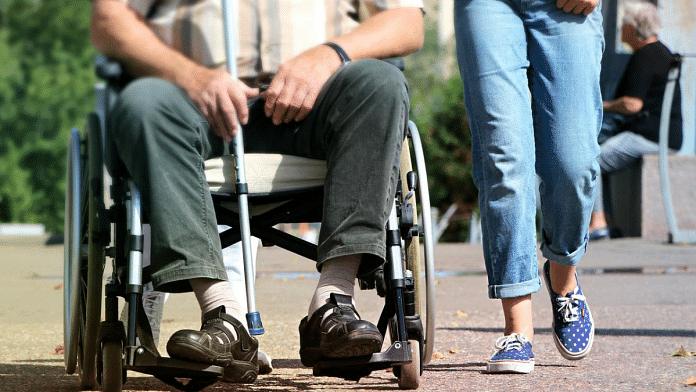- People with disabilities in Ukraine are not being fully served by current humanitarian structures.
- Inclusion and accessibility must be more thoroughly integrated into crisis response plans.
- The international community should support local organizations in providing the necessary resources and information.
People with disabilities in Ukraine have been confronting a crisis within a crisis on a daily basis. This invasion by Russia – typified by its attacks on civilian targets including hospitals and apartments – has put people with disabilities in peril. For those in wheelchairs, with vision impairment or any other form of disabilities, the exodus from war zones can be particularly arduous. As resources dwindle, many Ukrainians with hearing loss and intellectual disabilities are not even afforded a chance to evacuate.
It is imperative for the world to incorporate inclusion and accessibility into humanitarian response plans, in an effort to protect the disadvantaged during this unfolding crisis. Ukraine’s 2.7 million people with disabilities should not get left behind. In late February, I saw a picture of an elderly Ukrainian woman in a wheelchair, pleading with others for help to get to safety. It broke my heart as it reminded me of my own grandmother, who also used a wheelchair and faced extraordinary hardship every day. I had to act.
To help civilians with disabilities, I led a charitable organization to set up Rescue Ukraine, a project dedicated to helping children and refugees with disabilities. To better rally supplies for vulnerable families, we set up a shared online file that has since collected over 1,000 responses from Ukrainian refugees currently in Romania and Poland, telling us what they and their families need. From food and water to transport, to necessities such as catheters and diapers, and life-saving information translated into Ukrainian braille, the most vulnerable Ukrainians urgently need international support.
Helping people with disability in Ukraine
The present emergency response adopted by the international community has been centred on facilitating Ukrainians to travel to safety by train. Nevertheless, for people with severe intellectual disabilities, such as Opitz-Kaveggia syndrome, it is often not feasible to wait for hours at the train station since they may have a severe seizure at any time. To incorporate inclusion into humanitarian response in this case means to implement a system of fast access channels at train stations for people in need to pass through.
The international community should also safeguard the well-being of those who are unable to leave by train. By working with local hospitals, care providers and civil society organizations, the international community should verify in advance data on the number and location of people in need of help in at-risk regions. It is critical to stockpile life-saving humanitarian supplies, such as stretchers and medicines, as well as food and clean water, for people with disabilities as they await assisted evacuations. These operations are often carried out by local authorities and organizations with a limited budget, the international community should help fund these groups and expedite evacuations.
In addition, it is essential for an adequate humanitarian response to distribute safety information in accessible formats for people with vision or hearing impairment. Accurate knowledge about evacuation procedures, medical assistance locations and food protocols are often the key to survival during humanitarian disasters, yet people who may not see or hear such information may be left out. The international community can offer support to local authorities to print safety protocols in braille. In the case of Ukraine, there are people who may be more familiar with either the Ukrainian or Russian languages, so braille in both languages should be made available. The same pieces of information should also be translated into sign language for television broadcasts when possible.
Solidarity across civil society
Individuals and civil society organizations can also play a leading role in raising awareness of the plight of Ukrainians with disabilities and call for cross-border solidarity with those in need. Since February, social media has been employed by people in Ukraine as a highly effective means to expose the civilian toll of this callous Russian invasion, including the suffering of people with disabilities. Individuals and organizations outside Ukraine should help amplify Ukrainian people’s messages and also create content in their native languages to localize key information.
Launched by the World Economic Forum, the Strategic Intelligence platform further allows concerned citizens and groups to explore and contextualize key topics such as human rights and international security. Civil society organizations can gain access to strategic insights as they navigate through this ongoing crisis in Ukraine, devising action plans to serve those in need.
In 1867, philosopher John Stuart Mill articulated the treatment of the vulnerable as a moral test of human society: “Bad men need nothing more to compass their ends, than that good men should look on and do nothing.” In the face of the ongoing humanitarian crisis in Ukraine, inaction only perpetuates a painful situation. Instead, it is time for the international community to take a set of necessary steps in defence of the most disadvantaged people.
This article was originally published in the World Economic Forum.
Also read: Putin’s invasion of Ukraine likely to create a refugee crisis that rivals 1945



